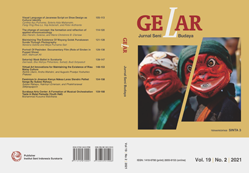Surabaya Arts Center: A Formation of Musical Orchestration Taste in Balai Pemuda (Youth Hall)
Main Article Content
Abstract
Abstract
This research aims to understand how taste can be formed and developed from a musical arts community called Pusat Olah Seni Surabaya (POSS). This community always holds practices in musical arts in the Balai Pemuda area. The study applied Bourdieu's concept of thinking about taste. Pierre Bourdieu first revealed this concept in his book “Distinction: A Social Critique of Judgement of Taste”, which explains how a person's social strata can be judged by which society he or she comes from and refutes a notion that pure subjective truth will never exist because the truth will always be dialectical. The findings show that by using Pierre Bourdieu's aesthetic taste, formed through the aspects of habitus, capital, and the realm contained in this phenomenon. The researcher sees POSS activity attempt to build a taste for music orchestration as a form of resistance from the lower class to upper-class culture.
Keywords: Habitus; Capital; Domain; Taste; Subculture
Downloads
Article Details
Copyright
Authors who publish with Gelar: Jurnal Seni Budaya agrees to the following terms:
- Authors retain copyright and grant the journal right of first publication with the work simultaneously licensed under a Creative Commons Attribution License (CC BY-SA 4.0) that allows others to share the work with an acknowledgment of the work's authorship and initial publication in this journal.
- Authors are able to enter into separate, additional contractual arrangements for the non-exclusive distribution of the journal's published version of the work (e.g., post it to an institutional repository or publish it in a book), with an acknowledgment of its initial publication in this journal.
- Authors are permitted and encouraged to post their work online (e.g., in institutional repositories or on their website) prior to and during the submission process, as it can lead to productive exchanges, as well as earlier and greater citation of published work.
References
Blunden, Andy. 2021. “Bourdieu on Status, Class and Culture.” In Hegel, Marx and Vygotsky, 387–401. Brill.
Breinholt, Asta, and Mads Meier Jæger. 2020. “How Does Cultural Capital Affect Educational Performance: Signals or Skills?” The British Journal of Sociology 71 (1): 28–46.
Calderon Gomez, Daniel. 2021. “The Third Digital Divide and Bourdieu: Bidirectional Conversion of Economic, Cultural, and Social Capital to (and from) Digital Capital among Young People in Madrid.” New Media & Society 23 (9): 2534–53.
Elianih, Lilih. 2020. “Javanese Artistic Taste in Didi Kempot Song Lyric.”
Fabiani, Jean-Louis. 2020. “Capital and Its Species.” In Pierre Bourdieu: A Heroic Structuralism, 56–76. Brill.
Fitzpatrick, Katie. 2020. “Using Bourdieu to Understand Health and Education.” In Social Theory and Health Education, 44–55. Routledge.
Gilleard, Chris. 2020. “Bourdieu’s Forms of Capital and the Stratification of Later Life.” Journal of Aging Studies 53: 100851.
Henke, Krystyna. 2021. “Situating Suzuki Music Pedagogy’s Values in the Literature.” Holistic Education Review 1 (2).
Holmqvist, Mikael. 2021. “Economics as Symbolic Capital: The Consecration of Elite Business Schools.” Theory and Society, 1–21.
Israel, Emil. 2021. “Place Habitus in the City and Suburbs: The Politics of Middle-Class Education and the Perspective of Elite Decisionmakers.” Cities 114: 103199.
Jolles, Jolle W, Andrew J King, and Shaun S Killen. 2020. “The Role of Individual Heterogeneity in Collective Animal Behaviour.” Trends in Ecology & Evolution 35 (3): 278–91.
Koch, Max. 2020. “Structure, Action and Change: A Bourdieusian Perspective on the Preconditions for a Degrowth Transition.” Sustainability: Science, Practice and Policy 16 (1): 4–14.
Lavoie, Avery, and Chloe B Wardropper. 2021. “Engagement with Conservation Tillage Shaped by ‘Good Farmer’ Identity.” Agriculture and Human Values, 1–11.
Motadel, David, and Richard Drayton. 2021. “Material Conditions and Ideas in Global History.” The British Journal of Sociology 72 (1): 26–38.
O’Brien, Dai. 2021. “Theorising the Deaf Body: Using Lefebvre and Bourdieu to Understand Deaf Spatial Experience.” Cultural Geographies, 14744740211003632.
Phelps, Christopher, and Robin Vandome. 2021. “Introduction: The Marx–America Dialectic.” In Marxism and America, 1–16. Manchester University Press.
Raditya, Michael H B. 2021. “The Popularisation and Contestation of Dangdut Koplo in the Indonesian Music Industry.” In Made in Nusantara, 114–22. Routledge.
Räsänen, Keijo, and Ilkka Kauppinen. 2020. “Moody Habitus: Bourdieu with Existential Feelings.” Journal for the Theory of Social Behaviour 50 (3): 282–300.
Saputra, Bagus Adhie, and Slamet Haryono. 2021. “Preserving Keroncong Orchestra Group: A Study Of OK. Waseso In Bumijawa Tegal.” Jurnal Seni Musik 10 (1): 40–46.
Sumiyani, Hidayah. 2020. “Collective Awareness in Ludruk Art in The City Of Surabaya.” Sembadra, Journal of Arts and Education Studies 2 (1): 1–9.
Sundari, Wiwiek. 2021. “Peer Review. Javanese Language Maintenance Through Javanese Traditional and Modern (Folk) Songs.”
Thapan, Meenakshi. 2020. Habitus, Performance and Women’s Experience Understanding Embodiment and Identity in Everyday Life. Routledge India.
Umanailo, M. 2020. “Dominance of Economic Capital.” International Journal Of Scientific & Technology Research Volume 9 (01): 1–4.
Valjanen, Tiina. 2021. “Tehran in Hook: Tehrani ‘Underground’ Musicians ‘Keeping It Real.’”
Widyana, Eka, Ida Yeni Rahmawati, and Muhibuddin Fadhli. 2020. “An Analysis of Politeness in Language in Early Childhood" A Case Study of the Habit of Listening to Dangdut Koplo Songs in Pudak Wetan Ponorogo".” Jurnal Indria Jurnal Ilmiah Pendidikan PraSekolah Dan Sekolah Awal 5 (2).
